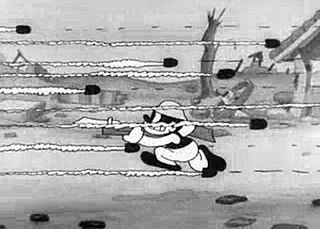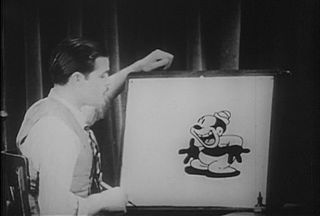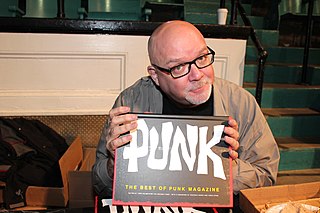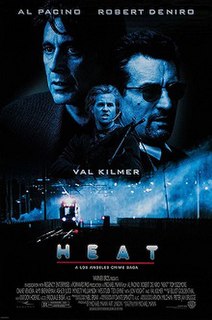
Bosko is an animated cartoon character created by animators Hugh Harman and Rudolf Ising. Bosko was the first recurring character in Leon Schlesinger's cartoon series, and was the star of 39 Looney Tunes shorts released by Warner Bros. He was voiced by Carman Maxwell, Johnny Murray, and Billie Thomas during the 1920s and 1930s, and once by Don Messick during the 1990s.

Isadore "Friz" Freleng, often credited as I. Freleng, was an American animator, cartoonist, director, producer, and composer known for his work at Warner Bros. Cartoons on the Looney Tunes and Merrie Melodies series of cartoons.
Hugh Harman and Rudolf Carl "Rudy" Ising were an American animation team best known for founding the Warner Bros. and Metro-Goldwyn-Mayer animation studios. They are particularly celebrated for Harman's 1939 antiwar MGM cartoon Peace on Earth and Ising's Oscar for the MGM cartoon The Milky Way in 1940.

Buddy is an animated cartoon character in the Warner Bros. Looney Tunes series of cartoons. He was the second star of the series, after Bosko.

Bosko the Doughboy is a one-reel 1931 short subject animated cartoon, part of the Bosko series. It was directed by Hugh Harman, and first released on October 17, 1931 as part of the Looney Tunes series from Harman-Ising Productions and distributed by Warner Bros. The cartoon is usually considered one of the better Hugh Harman Bosko cartoons.

Goopy Geer is an animated cartoon character in the Looney Tunes and Merrie Melodies series of cartoons from Warner Bros.

Foxy is an animated cartoon character featured in three 1931 animated shorts in the Merrie Melodies series distributed by Warner Bros. He was the creation of animator Rudy Ising, who had worked for Walt Disney in the 1920s.

Sinkin' in the Bathtub is the first Warner Bros. theatrical cartoon short as well as the very first of the Looney Tunes series. The title is a pun on the 1929 song Singin' in the Bathtub.

Bosko, the Talk-Ink Kid is a 1929 live-action/animated short film produced to sell a series of Bosko cartoons. The film was never released to theaters, and therefore not seen by a wide audience until 2000 on Cartoon Network's television special Toonheads: The Lost Cartoons. The film was produced in May 1929 and directed by Hugh Harman and Rudolf Ising.

Beans the Cat is an animated cartoon character in the Warner Bros. Looney Tunes series of cartoons from 1935-1936. Beans was the third Looney Tunes cartoon character star after Bosko and Buddy. He is voiced by Billy Bletcher and occasionally by Tommy Bond. He was created by directors Friz Freleng, Jack King, and Tex Avery.

John Holmstrom is an American underground cartoonist and writer. He is best known for illustrating the covers of the Ramones albums Rocket to Russia and Road to Ruin, as well as his characters Bosko and Joe.
Bosko's Picture Show was released on August 26, 1933, though at least one source claims the release date is September 18, 1933. It was the last Looney Tunes Bosko cartoon produced by Hugh Harman and Rudolf Ising for Leon Schlesinger and Warner Bros. The duo moved on to produce cartoons for MGM, the first of which were released in 1934. The music score was a work of Frank Marsales.
Doughboy is a former nickname for American soldiers.

The Booze Hangs High, released in 1930, is the fourth title in the Looney Tunes series and features Bosko, Warner Bros.' first cartoon character.
This is a listing of all the animated shorts released by Warner Bros. under the Looney Tunes and Merrie Melodies banners between 1930 and 1939, plus the 1929 pilot film which was used to sell the Looney Tunes series to Leon Schlesinger and Warner Bros. A total of 270 shorts were released during the 1930s.
Bosko's Parlor Pranks is a 1934 Happy Harmonies cartoon made by Hugh Harman and Rudolph Ising at MGM starring their creation, Bosko. It is the first Bosko cartoon made at MGM after Hugh Harman and Rudolph Ising moved from Warner Bros. However, Warner Bros. continue the ownership of MGM Cartoons alongside Turner Entertainment Co. In this cartoon, Bosko looks like his WB self, but after Hey-Hey Fever, Bosko's second MGM cartoon, the character was redesigned into a realistic African-American boy. Most of the animation in the cartoon is reused from the Looney Tunes shorts in which the titular character appeared in. It is also the first Bosko cartoon in color.
Boško is a Slavic male given name. It may refer to:
The Tree's Knees is a 1931 one-reel short subject featuring Bosko, part of the Looney Tunes series. It was released on July 25, 1931 and is directed by Hugh Harman and Rudolf Ising, the last cartoon in the series to be directed by the two; every Looney Tunes cartoon after this was directed by Hugh Harman until 1933, and every Merrie Melodies cartoon was directed by Rudolf Ising until the aforementioned year. It is also the last Bosko cartoon to not feature the main character's (Bosko's) name in the title. The short is also notable for the extensive use of footage from the earlier short Ain't Nature Grand! that it reuses, in particular a scene of Bosko happily and innocently pursuing a butterfly.
Bosko in Person is an American animated short film. It is a Looney Tune cartoon, featuring Bosko, the original star of the series. It was released on February 11, 1933, though one source claims the release date is April 10, 1933. Like most Looney Tunes of its day, it was directed by Hugh Harman; its score is by Frank Marsales. The film features Bosko and Honey in a vaudeville-act. This is the first cartoon directed by Friz Freleng.












